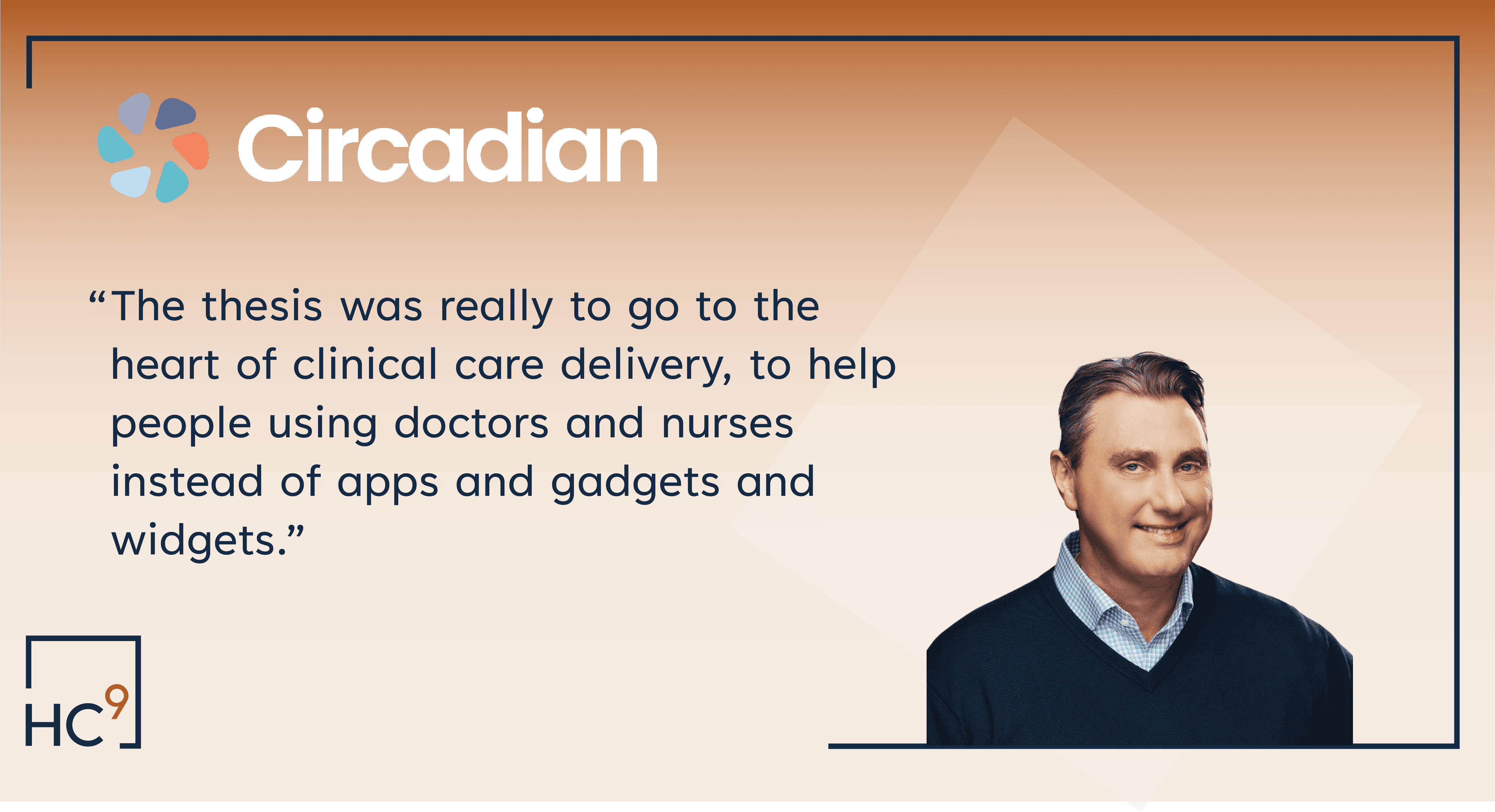
HC9 presents an interview series with portfolio company leaders. We’re interested in how they are solving health care’s biggest problems, what drove them to start a company, and why they chose to work with HC9.
Richard Lungen (Founder and General Partner, HC9 Ventures)
Today we are joined by Chuck Hector, President at Circadian. Thanks for being here Chuck. Tell us about Circadian. You have been involved in a number of successful companies. So obviously you saw something here that looked really interesting. What made you decide to get involved?
Chuck Hector (Circadian):
It really would begin when I was wrapping up my time at MD Live. The market had become saturated with virtual urgent care. MD Live, Teladoc, Amwell, all needed to pivot and do something better or different. My belief was that specialty telemedicine was the area of greatest need, but in 2019, that idea was not embraced by my former company.
I left MDLive to join PaPa , where I stayed for four and a half years, until the MD Live founders from West Palm Beach called me and said, “Hey, remember that specialty telemedicine idea you had? Well, we want to make that real.” They thought the timing was right because the current telemedicine players at scale were still focusing so much on virtual urgent care while the country needed national specialty telemedicine. Two days later, I met with the team. They had an idea for a new business and asked me to be a part of it, and I said, “I’m in.”

Richard Lungen
Circadian is headquartered in West Palm Beach today. When did you join?
Chuck Hector
It was May 2023 when the company was formed.
Richard Lungen
What has been the trajectory of the business since then?
Chuck Hector
The path has been very clear for us. With a backdrop of what’s currently going on in healthcare, the Version 28 changes, the claw backs to risk adjustment, and with a presidential administration that does not like rebating, a lot of the things that funded benefits and services has been shifting. We were starting a business in a tough time. But the thesis was really to go to the heart of clinical care delivery, to help people using doctors and nurses instead of apps and gadgets and widgets. It was really exciting.
But we knew that when we embarked on this, the sales cycle would be far longer because we’d be selling deeply integrative services into the population health and care delivery components of these risk bearing entities.
And still the trajectory has been great. Winning a contract with United Healthcare right out of the gate has probably been the most astounding milestone in the business. A contract with United is something that most companies never get. And if they do get it, it’s generally five or 10 years in the making. For that to happen so quickly speaks to our credibility, the size of the market problem we are impacting and to the great work that we’re doing.
The growth that we’re seeing is amazing; it’s just not fast. And that’s most things in health care, but when you’re selling a care delivery intervention, it’s even longer. To have that staying power and to be sticking with our convictions on the product modeling has really been important and special, something I’m proud of.
Richard Lungen
Can you describe the gap you identified in the specialty care market back in 2019 as well as today and how your model is addressing and solving that problem?
Chuck Hector
Having insight into my former employer’s data, MD Live, helped me identify a huge gap. We saw a lot of patients who had comorbid health conditions, and they would call in with a minor but acute issue such as sinusitis or conjunctivitis, but then they would say, “my diabetes is out of control, and I’m not sleeping well,” and they would think that because they had a doctor on the phone that they had a free pass to engage in any clinical conversation possible. Then we would have to let them know that we were only able to treat their minor ailment. They were on their own with their diabetes, hypertension, and any other chronic diseases. It was really frustrating to hear and see and the members’ disappointment at a moment when they were ready to engage.
Members would have their acute problem solved, but their chronic illness went unresolved. And those conditions were so much more life threatening, so much more costly and expensive, and such a larger problem for everyone in the health continuum, including the providers and the payers and the member themselves.
At that point in time, the telehealth companies were worried about profit margin and valuation and how they looked to the market. I could see that it was going to be a long road to move these massive battleships to a different clinical care model. At Circadian, we’re happy to let them continue to do that work. But there’s no national telemedicine company that’s delivering specialty care on a 50-state basis, and that’s the gap we’re focusing on.
Others have approached this challenge via apps and technology, but our belief is that they aren’t solving the problem. Most of them don’t work as well as they claim to, and now we’re seeing patients and health plans reverting back to the virtual house call. Patients are asking for a doctor who can respond to their condition specifically without having to log into and engage with a mobile app.
Richard Lungen
Chuck, how are you reaching out to patients and connecting into the continuum of care?
Chuck Hector
We’re reaching out to patients as Circadian offered through OptumCare for example. We let the patient know that their health plan is offering them the chance to see a remote cardiologist with a team that’s going to monitor them and take care of them at one in the afternoon or one in the morning. Patients will have a care team that is available and accessible around the clock, knows their health history and can manage their care appropriately in the moment. This solves a major access problem. In many areas, we have a scarcity of cardiologists and wait times are lengthening. In fact, where I live in Miami, a new patient appointment with a cardiologist, takes over 100 days to schedule.
And then what happens in those 100 days? If somebody is sick and they really need an appointment, they’re going to go to the emergency room for that care. And that’s the most expensive and possibly inappropriate place on Earth that you can access care for a chronic condition. You should have access to specialists in the home who can talk to you and treat you and care to keep you healthier. Those clinicians are out there. They just need to be in an arrangement where they can see you and see your data and practice modern medicine.
Richard Lungen
What do you feel makes Circadian unique and differentiated in the market as you move forward?
Chuck Hector
I think it’s a couple of things. It would be somewhat helpful to provide video access to doctors and nurses, but I think the thing that makes us different is that our doctors and nurses have access to the member’s health history. They can diagnose and prescribe virtually, and they can also deploy a range of hardware and devices that can help monitor the member’s health over time. The data from those devices is transmitted back to Circadian securely so that everybody on the care team knows how the patient is doing, whether they’re progressing or backsliding or if something isn’t working quite right. We have the ability to provide true value-based care in the home, almost like a medical home for cardiometabolic conditions.
With conditions like AFib or congestive heart failure, patients can live decades as long as they are under the proper supervision of a cardiologist and their condition is being actively managed. The problem is that we have major access issues in much of America, including in communities of color, rural communities, and urban communities. And those communities do without care and end up getting sicker and sicker until they’re in the emergency room, dying decades ahead of when they should be dying. We give them the chance to live a longer, healthier and fuller life.
Richard Lungen
As you look ahead at 2025, where will you be expanding?
Chuck Hector
I think there’s a lot of work to do in the cardio metabolic segment today and we’re only scratching the surface with United and the other contracts that we have that are complete or nearing completion.
We’re going to continue to lead with heart failure and monitoring as our flagship program. We’ve worked with an actuarial firm, Havarti, using actual customer data, and we have determined that there’s over a 7 to 1 ROI on our heart failure program. So, we know it’s valuable. Health plans are reacting very positively to the program, especially considering that heart failure readmission is always one of a health plan’s top three challenges.
Secondarily, we’re going to continue to expand our diabetes program. There are 800 apps in the App Store for diabetes management. The problem is they all rely on the member to champion themselves and to go in and input data every day which is cumbersome and laborious. People just don’t want to do it, and after a while they give up.
At Circadian, we use continuous glucose monitoring for these patients and push that data to the practitioners who can reach out if there’s a problem and be a place where they can have immediate access to a coach, a nurse or an endocrinologist.
Finally, our sleep program for employers is really taking off. We have a vast pipeline of self-insured employers that are looking to replace current sleep programs that are missing the mark and don’t have the same impact that ours has.
We’re really going to focus on those three things, and once we’ve established dominance in those categories, we might look at additional subspecialties to add into our common operating model.
Richard Lungen
Finally, Chuck, I have to ask…Why HC9? How did you find us and what attracted you to working with us?
Chuck Hector
HC9 was the first fund that came to mind when we talked about raising money, and of course we talked to a lot of funds, but I think right out of the gate we agreed that with HC9 you get to access people who really help you build your business.
HC9 is not just giving you money and then saying good luck, we will talk to you in 90 days. HC9 says, where can we help and how can we superpower this business? The HC9 team has so much experience in the segment. Unlike raising money with outsiders who have a big check book but don’t have the same access and experience, HC9 was going to be a home run.
Not only has HC9 provided us with funding, but they give us guidance and direction as leaders. I’m 30 plus years into my career, and I’m still learning from HC9 every day. Additionally, their LP base is, very attractive. Their investors are all healthcare insiders who are keeping an eye on the trends and are able to provide perspective on the industry. It’s impressive that they have pulled together such an amazing group like-minded individuals who appreciate what we’re doing and know that innovation is key to healthcare.
It’s really just been an amazing journey with HC9. Sometimes you wonder, hey, are they really going to deliver as they promise? Richard and the team have delivered for us in ways that are truly mind-bending, and we couldn’t have chosen a better partner. We’re so grateful that we were able to reach terms on the investment.
Richard Lungen
Awesome. Thank you, Chuck.
About Circadian:
For more information visit circadiancare.com.

